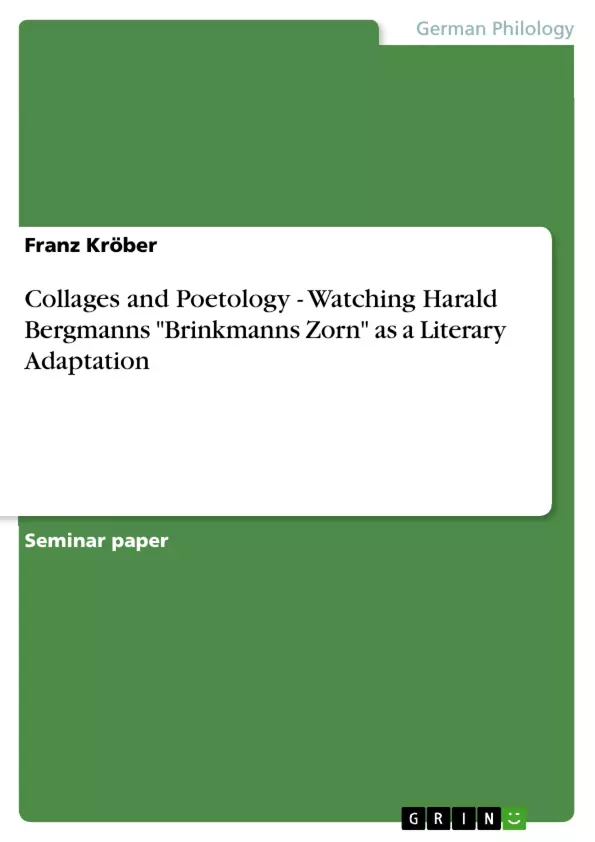This essay tries to give evidence for watching Harald Berkmann´s "Brinkmanns Zorn" as a literary adaptation. Based on this approach, the essay examines the adaptation of Brinkmann´s first person perspective in many of his texts and his collage-like style in with cinematic techniques.
Inhaltsverzeichnis (Table of Contents)
- Brinkmanns Zorn- a Literary Adaptation?
- Formal Features in Brinkmann's Texts and in Bergmann's Movie
- Poetology and the Treatment of Language in Brinkmann's Texts and in Bergmann's Movie
Zielsetzung und Themenschwerpunkte (Objectives and Key Themes)
This essay explores the film "Brinkmanns Zorn" by Harald Bergmann as a literary adaptation of Rolf Dieter Brinkmann's texts. The essay analyzes how formal features of Brinkmann's work, particularly his first-person perspective and collage-like style, are transferred to the film. It also examines the treatment of poetology and the relationship between language and reality in both Brinkmann's texts and Bergmann's film.
- The film's categorization as a literary adaptation
- The adaptation of Brinkmann's first-person perspective and collage-like style in the film
- The representation of Brinkmann's skeptical view on language and his poetology in the film
- The use of cinematic techniques to illustrate Brinkmann's audio recordings
- The interrelationship between author, text, and content in the film
Zusammenfassung der Kapitel (Chapter Summaries)
The essay begins by arguing that "Brinkmanns Zorn" can be considered a literary adaptation due to its use of Brinkmann's audio recordings and other textual artifacts. It highlights the film's cinematic illustration of these recordings and its representation of Brinkmann's texts through various visual elements.
The second section analyzes the adaptation of formal features from Brinkmann's texts, focusing on his first-person perspective and collage-like style. The essay demonstrates how the film mirrors these features through camera movements, scene juxtapositions, and the use of multiple voices in the narration of Brinkmann's collages.
The final section delves into the treatment of poetology in Brinkmann's texts and the film. It explores Brinkmann's skeptical view on language and his unconventional use of it, particularly in his poems and writings on poetology. The essay then examines how Bergmann represents this skepticism in the film, emphasizing the film's visual and auditory presentation of language as a tool to express reality.
Schlüsselwörter (Keywords)
This essay focuses on the following keywords: literary adaptation, Rolf Dieter Brinkmann, Harald Bergmann, "Brinkmanns Zorn," first-person perspective, collage-like style, poetology, language, reality, intertextuality, audio recordings, cinematic techniques.
Frequently Asked Questions
Is "Brinkmanns Zorn" a documentary or a literary adaptation?
The essay argues that the film should be viewed as a literary adaptation because it visually illustrates Rolf Dieter Brinkmann's texts and audio recordings.
How is Brinkmann's "collage style" represented in the film?
The film uses cinematic techniques like rapid scene juxtapositions and multiple narrative voices to mirror the fragmented, collage-like nature of Brinkmann's writing.
What role do audio recordings play in the movie?
Original audio recordings by Brinkmann serve as the primary source material, which the director Harald Bergmann translates into visual sequences.
What was Brinkmann's view on language?
Brinkmann had a skeptical view of language, seeing it as often inadequate to capture reality, a theme that the film explores through its unconventional structure.
Who was Rolf Dieter Brinkmann?
He was a significant German poet and writer known for his radical, pop-culture-influenced style and his critical stance towards traditional literary forms.
- Arbeit zitieren
- Franz Kröber (Autor:in), 2012, Collages and Poetology - Watching Harald Bergmanns "Brinkmanns Zorn" as a Literary Adaptation, München, GRIN Verlag, https://www.grin.com/document/199468



